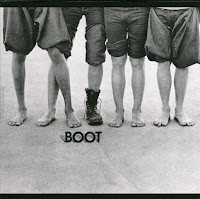Crushed Butler formed in 1969 with a lineup of Jesse Hector (guitar/vocals), Alan Butler (bass guitar), and Darryl Reed (drums). They initially played covers of other bands song before writing their own material.
Uncrushed captures three young hungry Londoners whose raw sound mesmerized their peers -- and blew away the days biggest names -- yet failed to blow open those corporate portals. Yes, Crushed Butler fell short because 1969's audiences didn't want anyone writing off their hippy dreams just yet. Reed's clattering snare drum on "It's My Life" is the perfect counterpoint for the song's up-the-system lyrics ("workin' like a slave, workin' for you/doing something I don't weanna do"). "My son's Alive's" explosive gallop is one of the missing links to thrash today, while "Love Fighter"'s grinding drone shows Crushed Butler realized that intensity didn't just come from tempo.
In early 1971, the band changed their name to Tiger, and the lineup changed to include Barry Wyles who was a member in an early version of Queen. The band tried again in February, 1971 with "High School Drop Out" however, Shorn of prospects, the band collapsed. But that's hardly an indictment when people are still trying to crack the code three decades later.
Hector and Butler continued on as Helter Skelter, and went on to form The Hammersmith Gorrilas (later shortened to the Gorillas), while Reed pursued a solo career. Reed was killed in a motorcycle crash in 2013 in Thailand.


















































